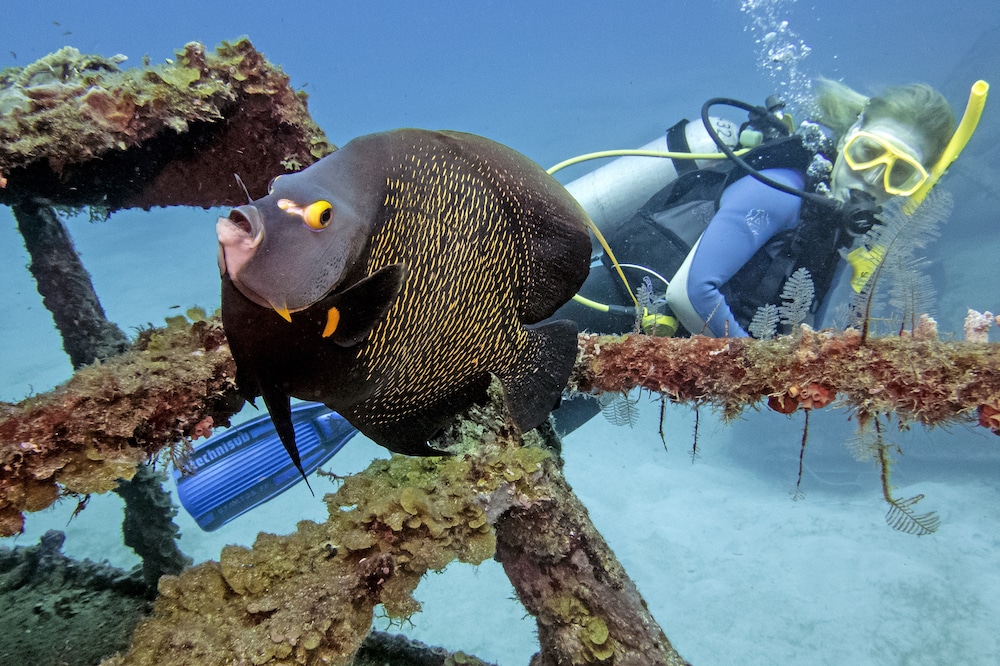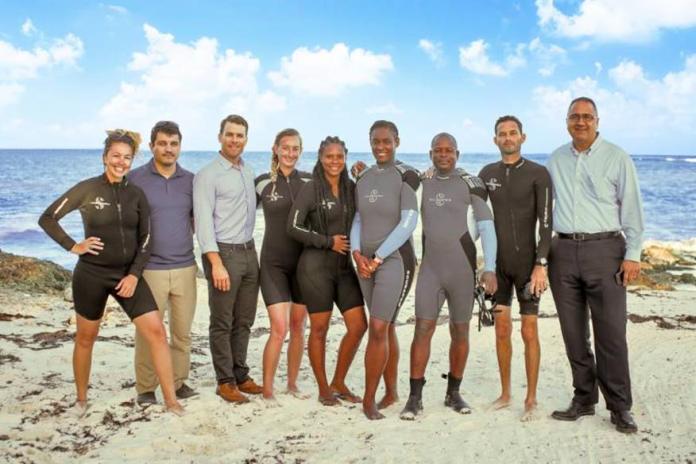Marine Life & Conservation
Caribbean tourism stakeholders work to protect and regrow coral reefs

Recognizing the environmental and economic value of healthy coral reefs, and the dangers posed by warmer oceans and more intense hurricanes, a group of tourism-focused organizations have joined forces to help protect and regenerate Caribbean reefs.
The nonprofit Tourism Cares, the Caribbean Hotel and Tourism Association (CHTA), and the Grupo Puntacana Foundation in the Dominican Republic have partnered on a Coral Restoration Capacity Building Project to assist three Caribbean destinations which suffered serious reef damage from the devastating storms of 2017.
Two individuals each from Dominica, the British Virgin Islands and the US Virgin Islands recently spent a week in Punta Cana, Dominican Republic, completing a Coral First Aid Certification training program. Additional individuals from the affected territories will now be trained by these graduates to assist with major restoration efforts.
Marine scientists have confirmed that coral reefs, which make up only one percent of the ocean floor but support 25 percent of marine life, have declined in the Caribbean by as much as 50 to 80 percent in 30 years.
“CHTA, through our affiliate Caribbean Alliance for Sustainable Tourism (CAST), has a longstanding working relationship with the Grupo Puntacana Foundation and we’re delighted to be able to draw upon the Foundation’s expertise to provide this training,” said Frank Comito, CHTA’s CEO and director general.

The Caribbean team on assignment in Punta Cana.
The Grupo Puntacana Foundation’s President Frank Rainieri was a founder of CAST and served as its first Chairman in 1997. The Foundation, with its own Center for Marine Innovation, has more than 14 years of experience in coral restoration. Having one of the largest coral nurseries in the Caribbean positions it as a leading coral gardening training institution.
“We have an environmental responsibility to regenerate these natural treasures because without reefs, there would be fewer beautiful beaches and without our beaches fewer tourists would visit, so coral gardening is both an ecological imperative as well as a significant economic driver for our region,” Comito stated.
Jake Kheel, vice president for the Grupo Punta Cana’s Corporate Environmental Programs, noted that the Foundation is “pleased to have this opportunity to share with our Caribbean colleagues best practice techniques for reef restoration”. He asserted that in addition to the regional environmental and economic impact of coral reefs, they also play a key role in the global ecosystem.
Paula Vlamings, CEO of Tourism Cares, believes this “smart partnership” between major organizations is crucial for hurricane impacted destinations: “We thank all the supporters of the Caribbean Tourism Recovery Fund who made the sharing of resources possible.”
Argel Horton and Emily Graff (British Virgin Islands); Augustus Bernard and Donna Mitchell (Dominica); and Logan Michelle and Jason Quetel (US Virgin Islands) took part in the training program.
While in the Dominican Republic, the participants interacted with world expert in coral restoration Dr David Vaughan, who is from the Mote Marine Laboratory in the Florida Keys. Vaughan instructed participants on a new methodology of coral restoration known as micro-fragmentation, which he developed to reverse coral degradation through its rapid regeneration and transplanting onto dead reefs.
Upon completion of the Coral First Aid Certification these graduates are now able to, among other skills, identify, construct and prepare at least two different types of nursery propagation platforms; set up new nurseries; properly attach coral fragments for propagation; perform regular maintenance; collect performance data using established standardized procedures; and properly harvest and transport coral fragments and colonies.
Visit www.caribbeanhotelandtourism.com to find out more.
Marine Life & Conservation
Leading UK-based shark conservation charity, the Shark Trust, is delighted to announce tour operator Diverse Travel as a Corporate Patron

 Corporate Patrons provide a valuable boost to the work of The Shark Trust. The Trust team works globally to safeguard the future of sharks, and their close cousins, the skates and rays, engaging with a global network of scientists, policymakers, conservation professionals, businesses and supporters to further shark conservation.
Corporate Patrons provide a valuable boost to the work of The Shark Trust. The Trust team works globally to safeguard the future of sharks, and their close cousins, the skates and rays, engaging with a global network of scientists, policymakers, conservation professionals, businesses and supporters to further shark conservation.
Specialist tour operator Diverse Travel has operated since 2014 and is committed to offering its guests high quality, sustainable scuba diving holidays worldwide. Working together with the Shark Trust will enable both organisations to widen engagement and encourage divers and snorkellers to actively get involved in shark conservation.
“Sharks are truly at the heart of every diver and at Diverse Travel, we absolutely share that passion. There is nothing like seeing a shark in the wild – it’s a moment that stays with you forever!” says Holly Bredin, Sales & Marketing Manager, Diverse Travel.
“We’re delighted to celebrate our 10th year of business by becoming a Corporate Patron of the Shark Trust. This is an exciting partnership for Diverse and our guests. We will be donating on behalf of every person who books a holiday with us to contribute towards their vital shark conservation initiatives around the world. We will also be working together with the Trust to inspire divers, snorkellers and other travellers to take an active role – at home and abroad – in citizen science projects and other activities.”
Paul Cox, CEO of The Shark Trust, said:
“It’s an exciting partnership and we’re thrilled to be working with Diverse Travel to enable more divers and travellers to get involved with sharks and shark conservation. Sharks face considerable conservation challenges but, through collaboration and collective action, we can secure a brighter future for sharks and their ocean home. This new partnership takes us one more valuable step towards that goal.”
For more information about the Shark Trust visit their website here.
For more about Diverse Travel click here.
Marine Life & Conservation
Shark Trust Asks Divers to help with Shark Sightings this Global Citizen Science Month

 Whether you are stuck for ideas of what to do with the kids or are off on the dive trip of your dreams. You can get involved in Citizen Science Month and help the Shark Trust by providing vital data about sharks are rays both close to home and further afield.
Whether you are stuck for ideas of what to do with the kids or are off on the dive trip of your dreams. You can get involved in Citizen Science Month and help the Shark Trust by providing vital data about sharks are rays both close to home and further afield.
In addition to reporting the sharks and rays you see on your dives, the eggcases you find on the beach, the Shark Trust is looking for some specific data from divers who are asked to report any Oceanic Whitetip and Basking Sharks.
Oceanic Whitetip Sharks
The Shark Trust are looking specifically for Oceanic Whitetip Shark sightings over the coming weeks and months. So, if you are diving anywhere in the world, please report your sightings via the website or app.
Website: https://recording.sharktrust.org/
App: Search The Shark Trust in your app store
The Oceanic Whitetip. Known for their incredibly long dorsal and pectoral fins, this species was once the most abundant oceanic-pelagic species of shark on the planet.
Large and stocky, they are grey or brown above, and white below and famous for their huge rounded first dorsal fin and paddle-like pectoral fins. The fins also highly prized within the shark fin trade. Whilst they are mostly solitary, Oceanic Whitetips do occasionally hunt in groups.
An inquisitive species, they were easy prey for fisheries. Combined with their low reproductive rate, they were inevitably at high risk of population depletion. And declines of up to 99% have been reported in certain sea areas. They are listed as Critically Endangered on the IUCN Redlist (2019).
Conservation efforts to discourage further declines include listing on CITES Appendix II and CMS Appendix I. They’re also the only species prohibited from take by all the Tuna RFMOs (Regional Fisheries Management Organisations). However, these measures do not mean that Oceanic Whitetips are not still caught – whether targeted or as bycatch – in some parts of the world. With populations declining at such a high rate, effective implementation of management measures is essential to ensure that the species can recover.
If you are lucky enough to get an image of an Oceanic Whitetip and you record your sighting on the Shark Trust app or website YOU CAN WIN! All images submitted with sightings, that also give consent to use in conservation messaging, will be in with a chance to win an Oceanic Whitetip T-shirt and mug. The competition will run until the end of “Shark Month” in July – so keep those sightings (and images) coming in.
Basking Sharks
Basking Shark (Cetorhinus maximus) season is upon us, and the Shark Trust is asking everyone to keep an eye out for these majestic giants over the summer months. If you see any, you can record your sighting to the Basking Shark Sightings database.
Each year, these mighty fish return to British waters to feed on plankton. You may see one, (or a few if you’re really lucky) from around April-October. They can be seen feeding at the surface of the water, where they look like they’re basking in the sun. Thus, their name!
Sighting hotspots around the British Isles include southwest England, Isle of Man, north coast of Ireland, and western Scotland. The Sea of the Hebrides is the most prolific sightings area in Scotland, but they have been spotted all around the coast and have even ventured into some of the sea lochs. The Shark Trust has received thousands of sightings since the Basking Shark project began, but more data is needed to truly understand what is going on with population numbers and distribution. You can help by recording your sightings this summer.
Great Eggcase Hunt
The Shark Trust has an Easter Egg Hunt with a difference for you to try. Take part in the Great Eggcase Hunt and get involved with a big citizen science project that helps shark, ray and skate conservation. And it’s an enjoyable activity for all the family.
The Shark Trust also want snorkellers and divers to record their underwater eggcase findings. Underwater records help pinpoint exactly where sharks and skates are laying their eggs and can help link to beach records. Learning the depth and substrate that they lay on also helps better understand the species.
Find out more: https://www.sharktrust.org/great-eggcase-hunt
Whether you are diving, snorkelling or exploring on the beach you can take part in Citizen Science Month and get actively involved in shark and ray conservation. Find out more: www.sharktrust.org
-

 News3 months ago
News3 months agoHone your underwater photography skills with Alphamarine Photography at Red Sea Diving Safari in March
-

 News2 months ago
News2 months agoCapturing Critters in Lembeh Underwater Photography Workshop 2024: Event Roundup
-

 Marine Life & Conservation Blogs2 months ago
Marine Life & Conservation Blogs2 months agoCreature Feature: Swell Sharks
-

 Blogs2 months ago
Blogs2 months agoMurex Resorts: Passport to Paradise!
-

 Blogs2 months ago
Blogs2 months agoDiver Discovering Whale Skeletons Beneath Ice Judged World’s Best Underwater Photograph
-

 Gear News3 months ago
Gear News3 months agoBare X-Mission Drysuit: Ideal for Both Technical and Recreational Divers
-

 Gear Reviews2 months ago
Gear Reviews2 months agoGear Review: Oceanic+ Dive Housing for iPhone
-

 Marine Life & Conservation2 months ago
Marine Life & Conservation2 months agoSave the Manatee Club launches brand new webcams at Silver Springs State Park, Florida









